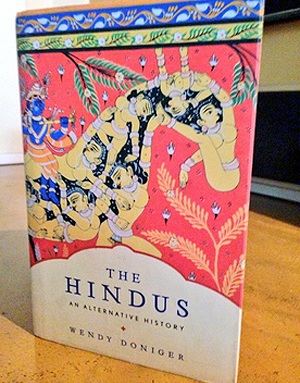How Hindus for once used the legal system well
 Wendy Doniger's book was NOT banned. There were NO book burnings. There were NO riots. The author was NOT sent death threats. On the contrary, the plaintiffs pursued due process. The case is a textbook example of how to proceed with civilised, democratic dissent, argues Rajeev Srinivasan.
Wendy Doniger's book was NOT banned. There were NO book burnings. There were NO riots. The author was NOT sent death threats. On the contrary, the plaintiffs pursued due process. The case is a textbook example of how to proceed with civilised, democratic dissent, argues Rajeev Srinivasan.
The discussion on social media and in the mainstream media about Wendy Doniger and her book The Hindus: An Alternative History has tended to focus on a single issue: Whether Doniger's freedom of expression had been violated when her publisher, Penguin India, decided to withdraw the book from circulation (only in India).
Of course, the book remains available on shelves outside India, and also in e-book form on the Internet, so anyone in India who wants to access it can feel free to use those channels.
There is an intriguing question as to what 'Freedom of expression' a non-Indian is entitled to in India. Not being a lawyer, I don't know, but an educated guess is that, in fact, a foreigner is entitled to no such freedom as an explicit guarantee in the Constitution or the criminal or civil codes; however, that there are commonly accepted guidelines that most nations (except authoritarian ones) may follow in the spirit of reciprocity.
These may mean that, in practice, a foreigner gets as much freedom of speech as a citizen. But we will leave that question aside for the moment.
The point I wish to emphasise, though, is that there is much disinformation and misinformation floating about, especially in the heat of debate, about what happened. It may be better to consider what did not happen: The book was NOT banned. There were NO book burnings. There were NO riots. The author was NOT sent death threats. In fact, there was none of the fanfare or theatrics that usually accompanies censorship.
On the contrary, the plaintiffs pursued due process. They went to court. I wish to emphasise that: They went to court, and following a truly democratic protest mechanism, filed a suit claiming (among other things) that they were offended, and their religious sentiments were hurt.
The court considered the suit, but before it could announce a verdict, the parties came to a peaceful, negotiated, out of court settlement. I believe the word you are searching for is 'civilised'.
... deleted
sent from samsung galaxy note, so please excuse brevity
No comments:
Post a Comment